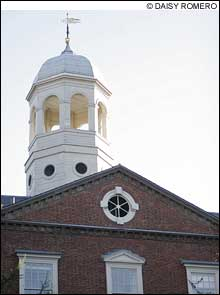 The Harvard presidential putsch, engineered by a minority faction of the Arts and Sciences faculty (itself a minority within Harvard’s combined faculties), may yet fail to accomplish the second half of its goal: to determine Lawrence Summers’s replacement. Although critical op-eds have appeared regularly, the news pages of the major dailies covering the crimson drama have been peculiarly silent about the brewing counter-rebellion against Summers’s ouster. That story is being told instead in the pages of the student-run Harvard Law Record, one of the oldest and most reliable independent sources of Harvard-campus news.
The Harvard presidential putsch, engineered by a minority faction of the Arts and Sciences faculty (itself a minority within Harvard’s combined faculties), may yet fail to accomplish the second half of its goal: to determine Lawrence Summers’s replacement. Although critical op-eds have appeared regularly, the news pages of the major dailies covering the crimson drama have been peculiarly silent about the brewing counter-rebellion against Summers’s ouster. That story is being told instead in the pages of the student-run Harvard Law Record, one of the oldest and most reliable independent sources of Harvard-campus news.
By January 26 — just five days after Summers announced his resignation — Michael Levenson reported in the Boston Globe that would-be academic kingmakers (actually, queenmakers) were already tossing out names of people supposedly on the inside track. The emphasis, predictably, was on women — mostly scientists (to atone for Summers’s supposed belittling of women’s innate scientific abilities) and African-Americans (to atone for Summers’s suggestion that Cornel West cut back on producing hip-hop, among other things, and spend more time on scholarship and teaching — see “Say It Ain’t So,” This Just In, January 28, 2005).
Names mentioned by the Globe, whose coverage of Summers’s troubles has tended to be sensationalistic, included: 1) Donna E. Shalala, president of the University of Miami and former Clinton cabinet member, who, when chancellor of the University of Wisconsin, brought student and faculty speech codes to that campus (the former were thrown out by a federal court, the latter repealed by the Wisconsin faculty senate after Shalala left); 2) Shirley M. Tilghman, scientist and president of Princeton University, who co-signed a shameless public statement attacking Summers for having the audacity to raise honest questions about why women are under-represented in the hard sciences; and 3) Nannerl O. Keohane, past president of Duke and Wellesley, and current member of the six-member Harvard Corporation, which lost its resolve and decided that Summers had to go. (Keohane was described in the Globe as “a scholar of political philosophy [who] has written on France and feminism.”) Also mentioned prominently in recent news reports is Drew Gilpin Faust, dean of the Radcliffe Institute, who, while at the University of Pennsylvania, was considered a politically astute but academically unexciting word-and-thought policewoman wedded to ideas not likely to be controversial among those on the faculty who took Summers down.
But even as these names are being circulated in the press, a growing number of respected Harvardians are speaking out, including faculty members who, had they been better organized earlier, might have given the Harvard Corporation the intestinal fortitude to stick it out with Summers. As the Harvard Law Record reported online on March 9, “The deans and faculty of Harvard’s graduate schools had a much different picture of the Summers tenure: a positive one, where there were healthy disagreements, but nothing worth resigning over.” The Record noted that, at the law school in particular, “public voices” were supportive of Summers. Quoted were law profs Charles Fried, Alan Dershowitz, and William Stuntz (the school’s vice-dean for intellectual life, who made the acid observation that Harvard, as the long-time “General Motors of American universities,” now has “embraced GM’s fate”). It was noted that a pre-resignation poll by the independent undergraduate newspaper the Harvard Crimson found students three-to-one against Summers’s resigning, and there’s no reason to believe that the students are changing their minds.